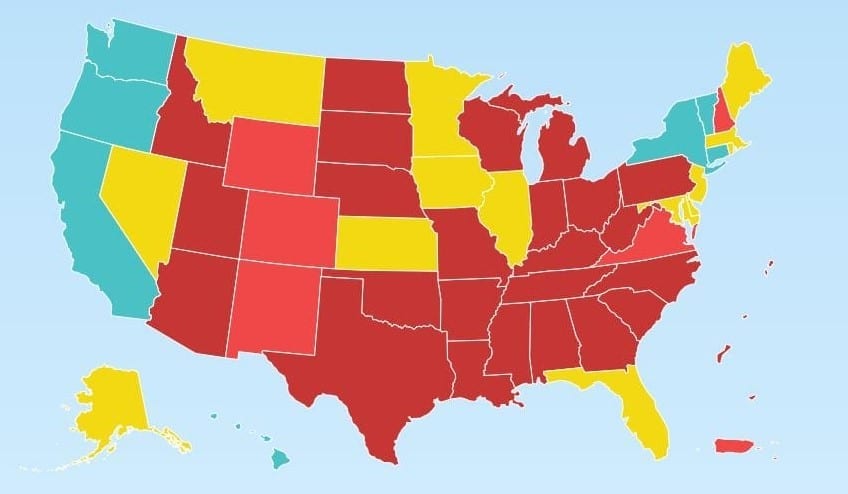Mississippi Abortion Ban Case Before the U.S. Supreme Court Poses a Direct Challenge to Roe v. Wade
In Dobbs v. Jackson Women’s Health Organization, the Center will defend abortion rights as Mississippi "stunningly" asks the Court to overturn Roe v. Wade.

Mississippi Asks Supreme Court to Overturn Roe v. Wade
In its brief filed 7/22, Mississippi asked the Supreme Court to uphold its abortion ban and overturn Roe v. Wade. In a statement reacting to the brief, Center CEO Nancy Northup said, “Mississippi has stunningly asked the Supreme Court to overturn Roe and every other abortion rights decision in the last five decades. Today’s brief reveals the extreme and regressive strategy, not just of this law, but of the avalanche of abortion bans and restrictions that are being passed across the country.” Read the full statement here.
In a direct challenge to Roe v. Wade and almost 50 years of precedent on abortion rights, this fall the U.S. Supreme Court will review a Mississippi abortion law that bans abortion after 15 weeks of pregnancy.
In the case, Dobbs v. Jackson Women’s Health Organization, the Center for Reproductive Rights will defend the right to abortion, a right recognized in the landmark 1973 Roe decision.
The state of Mississippi, in its opening brief filed in the case on July 22, asked the Court to overturn Roe v. Wade. (See more in the right hand column or read the Center’s full statement about the state’s brief.)
The Jackson Women’s Health case marks the first time the Court will rule on the constitutionality of a pre-viability abortion ban since Roe. Mississippi enacted its abortion ban in direct defiance of Roe and the nearly 50 years of Supreme Court precedent affirming Roe’s core holding—that every pregnant person has the right to decide whether to continue their pregnancy prior to viability.
On May 17, the Court announced it would hear Mississippi’s appeal of a Fifth Circuit Court of Appeals’ decision that threw out the Mississippi abortion ban. At the time, Nancy Northup, president and CEO of the Center for Reproductive Rights, said: “Alarm bells are ringing loudly about the threat to reproductive rights. The Supreme Court just agreed to review an abortion ban that unquestionably violates nearly 50 years of Supreme Court precedent and is a test case to overturn Roe v. Wade.”
The Center is representing Jackson Women’s Health Organization, the last remaining abortion clinic in Mississippi.
Oral arguments at the U.S. Supreme Court are expected to take place this fall, with the exact date to be announced.
Mississippi and Other U.S. States Have Passed a Wave of Unconstitutional Abortion Bans
What if Roe v. Wade is overturned?
What would happen to state abortion laws if the Supreme Court were to weaken or overturn Roe v. Wade? Explore the Center’s “What if Roe Fell?” interactive map to find out.
Mississippi has some of the most restrictive abortion laws in the country—including state-mandated biased counseling, a mandatory delay period, and a ban on telemedicine for abortion care—making it difficult and sometimes impossible to access abortion care in the state. Mississippi is one of 12 states with trigger bans, intended to prohibit abortion entirely if Roe v. Wade is overturned and is also one of the 14 states that have recently passed pre-viability abortion bans. Abortion remains legal in Mississippi and the 15-week ban remains blocked while the case proceeds. Read more about Mississippi’s abortion restrictions here.
Every ban on abortion at varying points in pregnancy that has been challenged has been struck down. Yet even as Roe stands, states have found ways to push abortion out of reach. Restrictions on abortion care disproportionately harm people who already face significant barriers to accessing health care—particularly Black, Indigenous, and people of color and people having difficulty making ends meet. If Roe falls, states hostile to abortion rights could move to ban abortion entirely, and the impact will fall hardest on the same people.
More About Dobbs v. Jackson Women’s Health Organization
Find out more about Dobbs v. Jackson Women’s Health Organization and its significance to the future of U.S. abortion rights:

